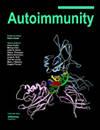MiR-300靶向IL-37促进类风湿性关节炎成纤维细胞样滑膜细胞的增殖、迁移和侵袭
IF 3.3
4区 医学
Q3 IMMUNOLOGY
引用次数: 3
摘要
摘要背景成纤维细胞样滑膜细胞(FLS)是类风湿性关节炎(RA)发病机制中的重要调节因子。据报道,微小RNA(miR)参与调节RA的发病机制。在这项研究中,我们探讨了miR-300对从RA患者身上获得的FLS增殖、迁移和侵袭的调节作用。方法采用qPCR方法检测RA患者和健康对照滑膜组织中miR-300和白细胞介素37(IL-37)mRNA的表达。采用细胞计数试剂盒-8(CCK-8)法和Transwell法研究miR-300对FLS增殖、迁移和侵袭的调节作用。采用ELISA法检测TNF-α、IL-6和IL-8水平,评价炎症反应。应用生物信息学分析和萤光素酶报告基因测定来验证miR-300和IL-37之间的靶向关系。采用蛋白质印迹法检测FLS中IL-37蛋白的表达。结果MiR-300在RA患者滑膜组织和FLS中表达明显下调;同时IL-37表达上调。miR-300模拟物的转染增强了RA-FLS的生长、迁移、侵袭和炎症反应;miR-300抑制剂的转染抑制了RA-FLS的生长、迁移、侵袭和炎症反应。IL-37被鉴定为miR-300的下游靶标,IL-37部分抵消了miR-300诱导的RA-FLS增强的生长、迁移、侵袭和炎症反应。结论MiR-300通过靶向IL-37促进FLS的生长、迁移、侵袭和炎症反应,提示其是RA发病机制中的重要调节因子。本文章由计算机程序翻译,如有差异,请以英文原文为准。
MiR-300 promotes the proliferation, migration and invasion of fibroblast-like synoviocytes in rheumatoid arthritis by targeting IL-37
Abstract Background Fibroblast-like synoviocytes (FLS) are crucial regulators in the pathogenesis of rheumatoid arthritis (RA). Reportedly, microRNA (miR) participates in regulating the pathogenesis of RA. In this study, we explored the regulatory effects of miR-300 on the proliferation, migration and invasion of FLS, which were obtained from RA patients. Methods qPCR was utilized to detect miR-300 expression and interleukin-37 (IL-37) mRNA expression in the synovial tissue of RA patients and healthy controls. Cell counting kit-8 (CCK-8) assay and Transwell assay were performed to investigate the regulatory function of miR-300 on the proliferation, migration and invasion of FLS. ELISA was employed to detect TNF-α, IL-6 and IL-8 levels, to evaluate the inflammatory response. Bioinformatics analysis and luciferase reporter assay were applied to validate the targeting relationship between miR-300 and IL-37. Western blot assay was executed to detect IL-37 protein expression in FLS. Results MiR-300 was revealed to be markedly down-modulated in the synovial tissue and FLS of RA patients; meanwhile, IL-37 expression was up-modulated. The transfection of miR-300 mimics enhanced RA-FLS growth, migration, invasion and inflammatory response; transfection of miR-300 inhibitors repressed the growth, migration, invasion and inflammatory response of RA-FLS. IL-37 was identified as a downstream target of miR-300, and IL-37 partially counteracted the enhanced growth, migration, invasion and inflammatory response of RA-FLS induced by miR-300. Conclusion MiR-300 facilitates growth, migration, invasion and inflammatory response of FLS by targeting IL-37, suggesting it was a crucial regulator in the pathogenesis of RA.
求助全文
通过发布文献求助,成功后即可免费获取论文全文。
去求助
来源期刊

Autoimmunity
医学-免疫学
CiteScore
5.70
自引率
8.60%
发文量
59
审稿时长
6-12 weeks
期刊介绍:
Autoimmunity is an international, peer reviewed journal that publishes articles on cell and molecular immunology, immunogenetics, molecular biology and autoimmunity. Current understanding of immunity and autoimmunity is being furthered by the progress in new molecular sciences that has recently been little short of spectacular. In addition to the basic elements and mechanisms of the immune system, Autoimmunity is interested in the cellular and molecular processes associated with systemic lupus erythematosus, rheumatoid arthritis, Sjogren syndrome, type I diabetes, multiple sclerosis and other systemic and organ-specific autoimmune disorders. The journal reflects the immunology areas where scientific progress is most rapid. It is a valuable tool to basic and translational researchers in cell biology, genetics and molecular biology of immunity and autoimmunity.
 求助内容:
求助内容: 应助结果提醒方式:
应助结果提醒方式:


